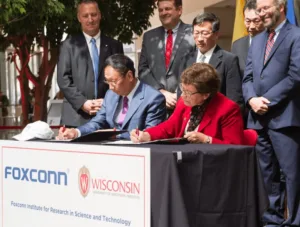Foxconn chairman and founder, Terry Gou, has announced plans to invest $100 million in engineering and innovation research at the University of Wisconsin–Madison in the US, while also creating the framework for a science and technology institute that will collaborate closely with the company’s facilities in southeast Wisconsin.
The investment will include funding to help establish a new interdisciplinary research facility for the College of Engineering on the campus. Gou and other senior Foxconn executives paid a visit on Monday and, with university officials, signed several agreements designed to formalise and streamline their future working relationship.
The Foxconn Institute for Research in Science and Technology (FIRST) will have its main location at the Wisconn Valley Science & Technology Park near Racine and will also have an off-campus presence in Madison. The agreements formalise UW’s commitment to being part of research efforts at FIRST and Foxconn’s commitment to activities such as research, recruiting, creating opportunities for internships and hands-on work in campus labs.
In addition, the planned Engineering building will enhance the college’s capabilities and allow it to be an active partner in research of mutual interest with FIRST.
With Foxconn’s lead gift of $100 million, UW–Madison plans to raise an additional $100 million as part of a $200 million fundraising subcampaign in the final two years of the $3.2 billion All Ways Forward campaign. The initiative will focus on supporting research that advances engineering, data and computer science and human health.
The partnership is expected to create 13,000 jobs in the state. Areas of potential study could include Advanced Technology on Panel, biochips, semiconductors, application-specific integrated circuits, smart building, smart infrastructure and smart city development, high-performance computing, high-speed communications networks, cloud server storage, sensors, robotics and IT systems.
There will also be a focus on advancing research on human health in areas such as genomics, immune cell research, clinical data integrity and processing and medical imaging in cancer and related diseases. The two parties will also work together to identify and develop initiatives to promote technological advancement, education and scientific outreach.

